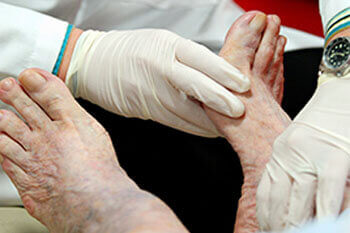
Senior Foot Care in Detroit, MI
The feet support and carry your body weight throughout your entire lifetime. Because of this, it’s no wonder that they tend to experience wear and tear as we age. With that being said, it’s important we care for our feet on a daily basis; it’s especially important, however, that we care for our feet into old age, when they are more prone to developing certain conditions. Some common foot complications that tend to affect elderly patients include bunions, changes in the overall foot structure, arthritis, fungal or ingrown toenails, and general foot pain or soreness.
Elderly Foot Care: Common Problems
Some of the most common problems are foot ulcers, ingrown toenails, fallen arches, and fungal infection. A foot ulcer is an open sore on the foot and can be a result of decreased sensation in the feet. An ingrown toenail is defined as when the nail grows into the side of the toe. Fallen arches are indicated by the instep of the foot collapsing. A fungal infection is a condition that results in deformed and discolored toenails.
As we age, our feet tend to grow in size. If you’re not regularly changing your footwear to properly and comfortably fit the size of your feet, and in turn, are constricting your toes, it’s likely you may develop a bunion or hammertoe. These conditions can be incredibly uncomfortable and may cause a great deal of pain if not properly treated by a podiatrist. Caring for our feet can become more difficult as we age. In order to help avoid incorrectly cutting the toenails, it’s advised that you seek the care of a podiatrist who can trim your toes straight across, preventing the formation of an ingrown toenail. The older we get, the more our chances of having arthritis increases. Arthritis tends to be the cause of foot pain, as well as stiffness, and can even lead to the development of the foot conditions listed above. Patients have found relief from the discomfort caused by arthritis by wearing custom orthotics, as well as including light stretches in their daily routine.
Proper foot hygiene is also important. Making sure that you always have clean, dry socks on can be a major deterrent to many different problems, including bacterial infections, foot odor, and certain types of fungus. Wet feet are a major cause of many of these problems. If your socks get wet, it is important to change them. Walking around in wet socks may not only lead to various infections, but can irritate the skin and result in a number of various complications. Clean, dry feet are less likely to be affected by fungal and other infections.
Proper footwear is another way to keep feet healthy. Shoes that fit well and provide proper support help prevent ingrown toenails and fallen arches.
For more information and tips on maintaining proper health for geriatric feet, we recommend you consult with a podiatrist for professional care and guidance.
